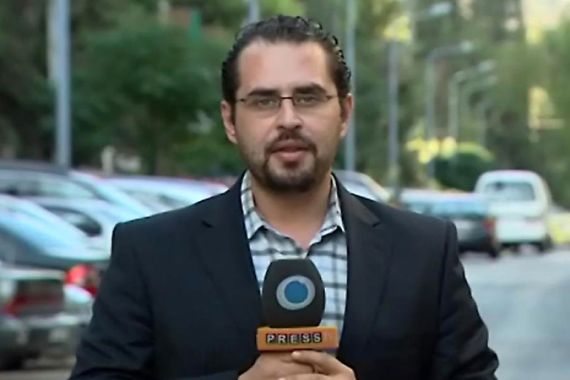Press TV correspondent killed in Damascus
Maya Nasser shot by “insurgents” while reporting on large blasts at the Syrian army’s headquarters, network says.

Maya Nasser, a correspondent for Iran’s Press TV network, has been killed by a sniper while reporting on air in Damascus, according to the network.
Hossein Mortada, who serves as Damascus bureau chief for both the English-language Press TV and Arabic-language Alam TV, was wounded in the same attack, the network said on Wednesday.
A statement posted on Nasser’s Arabic-language Facebook page said he had been shot through the neck while he and Mortada covered the aftermath of large explosions at the army’s general staff headquarters at Umayyad Square.
The statement described how “armed terrorists” arrived in civilian cars while others took positions atop three surrounding buildings and opened fire on the square. Mortada was shot in the leg, the network said.
“We hold Turkey, Saudi Arabia and Qatar, who provide militants weapons to kill civilians, military personnel and journalists, responsible for the killing of Maya,” Hamid Reza Emadi, Press TV news director, said on air from Tehran.
“Press TV will be pursuing the matter of the murder of Maya and will not let those who killed our correspondent feel like they can kill media people and get away with it.”
Rising toll
Nasser’s killing brings the number of journalists killed while reporting Syria’s civil war to 22, according to the Committee to Protect Journalists.
On September 19, government forces killed a citizen journalist in Hama who had filmed videos for the online Sham News Network.
Government shelling killed a Japanese journalist in Aleppo in late August, while a state television reporter and an army defector who worked with various media organisations were killed in separate incidents earlier that month.
Press TV had previously featured Nasser on air as a Damascus-based political analyst and commentator – it was not clear when he became an employee of the network. He had also appeared in amateur YouTube interviews with foreigners inquiring about the civil war in Syria.
Many in the international media took note of Nasser’s reporting after rebels began their major assault on Aleppo, the country’s largest city, in July. He was one of a small number of English-speaking journalists to report those events from the government’s side of the battle.
Nasser’s writings on Twitter and Facebook were sympathetic to the government and did not take the positive view of rebels held by those who back the uprising.
He referred to anti-government fighters as “militias” and emphasised how foreigners with radical religious motives had taken root in the rebellion.
‘Normal citizen’
Nasser expressed fear that Syrians would not be able to force out the foreigners and that the country would, like Afghanistan, be used as a base for Arab jihadists.
But Nasser also expressed sadness at the war that had engulfed his country, describing himself as “a normal citizen” who “[doesn’t] have [a] problem with anyone as long as they can preserve all rights based on citizenship”.
During an exchange with another Twitter user deeply opposed to Assad, he wrote: “[I]t would be great to meet some day we both see Syria as priority we might disagree on the how but its normal.”
Two days before his death, Nasser wrote on Twitter: “In wars like this there is no winner or looser … everybody looses and the most pay the price are Syrians …”